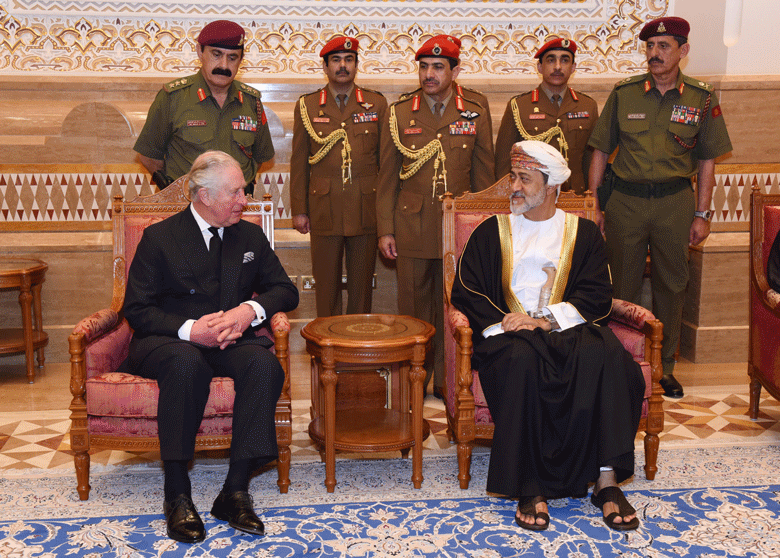

On 11 January 2020, Haitham bin Tariq bin Taimour al-Said was sworn in as the new Sultan of Oman, becoming only the country’s second ruler in half a century.
The former minister of culture and heritage's appointment followed the death of Sultan Qaboos bin Said bin Taimour al-Said on 10 January.
Sultan Qaboos will be a tough act to follow.
Widely respected abroad and much-loved domestically, Sultan Qaboos had been in power for nearly 50 years.
He was the longest-serving leader in the Arab world and had a well-earned reputation as one of the Middle East’s canniest politicians.
Sultan Haitham takes the reins of power in challenging times for the sultanate and for the region.
Regional geopolitical tensions are high following the assassination of Iranian military commander Qasem Suleimani in a US drone strike in Baghdad on 3 January. While on Oman's southern border, the war between a Saudi Arabia-led coalition and the Iran-backed Houthis in Yemen is now into its fifth year.
At home, low oil prices and a growing population have left Muscat facing a major economic challenge to maintain growth and public services while at the same time keeping a lid on national finances.
Continuity promise
Despite the considerable challenges facing the country however, the smooth handling of Haitham's succession, a transition that many feared might trigger instability, will give Omanis and investors alike a considerable degree of confidence about the outlook for Oman.
Having been nominated by Qaboos, Sultan Haitham in his accession sought to send out very clear signals of continuity for the sultanate.
In his accession speech, Haitham said that Oman would continue to pursue the policies set by Sultan Qaboos in order to "preserve the gains that he made and to build upon them".
"We shall march forward on this road so that Oman can attain and maintain the prominent place in which [Sultan Qaboos] wished to position it," he said.
Aged 65, Sultan Haitham is a cousin of Qaboos.
He is a graduate of Oxford University in the UK and is an experienced government official.
Diplomatic role
As well as serving as Oman's minister of culture and heritage, Sultan Haitham held top-ranking posts in the country's foreign ministry for many years.
The new sultan said that he would seek to continue Qaboos' commitment to maintaining Oman’s role in the GCC, and to fostering good relations with its neighbours in the region, particularly with the UAE and Saudi Arabia, as well as with Iran.
"In the foreign front, we shall trace the course of the late Sultan," he said in his accession speech. "Reaffirming the fundamentals of our country’s foreign policy based on peaceful co-existence with nations, good neighbourliness, non-interference in the internal affairs of others, respect for countries’ sovereignty and international cooperation in various spheres.
"We will call and contribute to resolving disputes by peaceful means," he said. "Sparing no effort in finding satisfactory solutions in a spirit of harmony and understanding.
"We will continue contact with our brethren, leaders of Arab Gulf Cooperation Council (GCC), to enhance our countries’ march of collaboration to realise our peoples’ aspirations and to push the GCC forward.
"On the Arab front, we will continue to support the Arab League and cooperate with our brethren, leaders of Arab states, to achieve the goals of the Arab League," he said.
Haitham is experienced at the highest levels of international diplomacy, and has good relations with both Arab and Western leaders. In 2016, he personally hosted a visit to Oman by the UK's Prince Charles.
Economic moderniser
Haitham is one of the sponsors of Oman's Vision 2040 social and economic reform initiative, which aims to diversify Oman's economy away from its dependence on oil and gas exports, and open the country up to private sector investment.
His succession sends a clear message that Muscat will continue on its path to diversify and privatise Oman's economy.
Despite a long career in government, Haitahm is well versed in the needs of the private sector, having shared several business interests with his brother Sayyid Talal.
It has been reported the brothers held business interests in construction, energy, telecommunications and real estate, including the Blue City development.
He is likely to continue Muscat's drive to liberalise the country's economy and streamline Oman's bureaucratic frameworks.
The new sultan is known to be a sports enthusiast and was the first head of Oman's football federation in the early 1980s.
Sultan Haitham is reported to be married with two sons and two daughters.
Oman in features
 Oman makes slow progress with economic reforms
Oman makes slow progress with economic reforms
The sultanate’s banks tackle tight liquidity and problem loans
Oman pursues an intensive upstream exploration campaign
The sultanate aims to sustain downstream activity levels
You might also like...

Rainmaking in the world economy
19 April 2024

Oman receives Madha industrial city tender prices
19 April 2024

Neom seeks to raise funds in $1.3bn sukuk sale
19 April 2024

Saudi firm advances Neutral Zone real estate plans
19 April 2024
A MEED Subscription...
Subscribe or upgrade your current MEED.com package to support your strategic planning with the MENA region’s best source of business information. Proceed to our online shop below to find out more about the features in each package.





